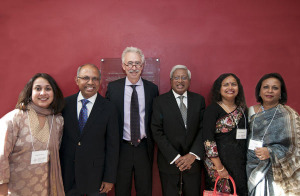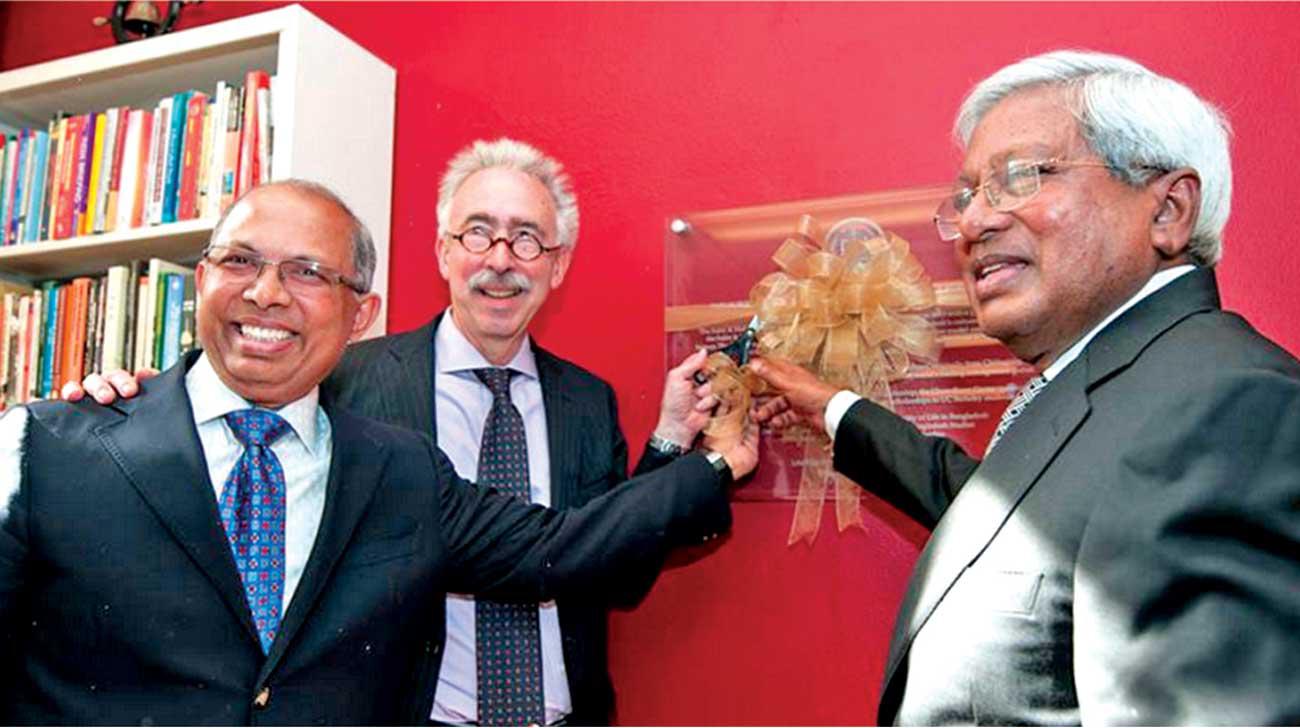A first of its kind effort in the United States, the center will merge research, scholarship, art and culture, and building ties between institutions in Bangladesh and the U.S.
Quality & Me
Subir shares his own personal efforts to work toward continuous improvement within his own community, among his friends and family.
The Subir & Malini Chowdhury Center for Bangladesh Studies at the University of California, Berkeley has an ambitious mission ahead. At the top of their list are innovative projects that aim to improve garment-industry safety, apps to solve social problems, and gathering data on antibiotic-resistant bacteria found on fruits and vegetables. And that’s only a month after it opened on March 30.
Chancellor Nicholas Dirks presided over a ribbon-cutting ceremony. Sir Fazle Hasan Abed, founder of BRAC University — one of the universities with which the center will partner — gave a guest lecture to celebrate the center’s launch after the ceremony.
A first of its kind effort in the United States, the center will merge research, scholarship, art and culture, and building ties between institutions in Bangladesh and the U.S. under the leadership of Sanchita Saxena, who also leads the Institute for South Asia Studies at Berkeley.

(L-R) Sanchita Saxena, Director of the Chowdhury Center, UC Berkeley; Subir Chowdhury, (Donor); Chancellor Nicholas Dirks of UC Berkeley; Sir Fazle Abed, Founder of BRAC; Malini Chowdhury (Donor); Lady Abed
Helped along with a $1 million seed fund from the Subir and Malini Chowdhury Foundation, the center will support research to improve lives in Bangladesh and showcase the country’s culture, history, talent and resilience in the face of intense trials, and emphasize:
- Exchange and scholarship programs to take UC Berkeley student and faculty researchers to Bangladesh to study, work and exchange ideas.
- Academic partnerships like one in the works with Bangladesh-based BRAC University, which is funded by the largest international, non-governmental development organization.
- The study of Bangla culture, history and language.
- Support for graduate students through two annual graduate fellowships focused on the quality of life in Bangladesh and pursuing Bangladesh studies, and for undergraduates through one annual scholarship studying South and Southeast Asian Studies.
- Development of a Bangladesh component that can be incorporated in other courses in areas ranging from public health to engineering or metropolitan studies.
UC Berkeley Chancellor Nicholas Dirks, an internationally renowned anthropologist and scholar of Indian ethno-history, was present for the unveiling of the new Center.
“The Subir and Malini Chowdhury Center for Bangladesh Studies underscores UC Berkeley’s commitment to provide our faculty and students with expanded options for engagement with global issues,” Dirks said. “We have a great deal of expertise to share, and much to learn from others as we confront challenges that know no national border.”
India-West, the largest and most prestigious among weekly Indian newspapers on the U.S. west coast, published an article celebrating the Center as a seminal event that puts Bangladeshi study on the map at the university. Sanchita B. Saxena, executive director of the Center for South Asia Studies at Berkeley and director of the new center, was quoted:
“The study of Bangladesh has been, for the most part, quite marginalized at most academic institutions. Centers focused on South Asia are almost always heavily dominated by faculty, students and research focused on India. So the other countries in South Asia (including Pakistan, Nepal, and Sri Lanka) are often neglected.
“The Chowdhury Center really tries to solve this problem by highlighting what is currently happening in the field of Bangladesh studies — everything from arsenic removal in the drinking water to understanding microfinance to literature and culture.
“Our goal of showcasing innovative research and training the next generation of scholars in Bangladesh has been realized through this gift which includes the establishment of the Chowdhury Center, but also three critical funding opportunities for students: two graduate fellowships (one to study the quality of life improvements and the other on any aspect of Bangladesh studies) and an undergraduate scholarship.”
The launch of the center this year is the closes a two-decade circle for Chowdhury and Raka Ray, chair of the Department of Sociology and professor of South and Southeast Asia studies at UC Berkeley.
In 1993, Ray asked Chowdhury for help to establish a Bangla language program. “I had no money then,” Chowdhury said. But he promised himself that if he ever did, he would “help her cause.”
The center is screening applications from scholars who want to advance their studies in Bangladesh. Caitlin Cook, one of the center’s two inaugural fellows, helped gather data on antibiotic-resistant produce-borne bacteria.
“I got a real appreciation for the talent of Bangladeshi researchers and the quality of the work they’re doing there,” said Cook, who is currently completing a master’s degree in public health at UC Berkeley. “This fellowship has really put me on the right track to work in global health.”
Berkeley’s Bangladesh studies center is also developing an exchange program for faculty and students at UC Berkeley and BRAC University, in Dhaka, as well as a summer study-abroad program at the Asian University for Women in Chittagong, Chowdhury’s hometown. In October, the center will co-host UC Berkeley’s second Bangladesh Development Initiative conference.
Direct links:
First Bangladesh Studies Center in US, at UC BerkeleyThe Daily Star, Weekend Bulletin, April 17, 2015
U.C.Berkeley Launches 1st Bangladesh Studies Center in U.S. India West, Richard Springer, April 9, 2015
First Center for Bangladesh Studies Now Open at UC Berkeley NBC News, Jennifer Chowdhury April 3, 2015
Dr. Sanchita Saxena, Executive Director of the Chowdhury Center, interview for TBN24 Prime Time News April 1, 2015
বার্কলেতে বাংলাদেশ গবেষণা কেন্দ্রের আনুষ্ঠানিক যাত্রা শুরু আজ (The establishment of a research institute for the study of Bangladesh in Berkeley) Prothom Alo, Hasan Ferdous, March 31, 2015
UC Berkeley celebrates launch of Subir & Malini Chowdhury Center for Bangladesh Studies Daily Californian, Elaina Provencio, March 31, 2015
Bureau of South Central Asian Affairs, Dept. of State, Twitter feed, March 30, 2015
UC Berkeley first university to house a center for Bangladesh studies UC Berkeley News Center, Thomas Levy, March 25, 2015
(Cover Story) Making it Happen Md Shahnawaz Khan Chandan, The Daily Star, May 9, 2014
Subir Chowdhury Puts Bangladesh Studies on U.C.’s Map Richard Springer, Staff Reporter, India West, Apr 23, 2014
Bangladesh takes center stage with Subir and Malini Chowdhury Center, By Kathleen Maclay, UC Berkeley Media Relations
April 21, 2014
Radio Interview of ISAS Executive Director, Sanchita Saxena, Preeti Mangala Shekar for KPFA 94.1 FM’s APEX Express, February 27, 2014 – 7:00pm
A Bangladeshi’s million dollar gift to Berkeley, Sohara Mehroze Shachi for Dhaka Tribune, February 23, 2014



















